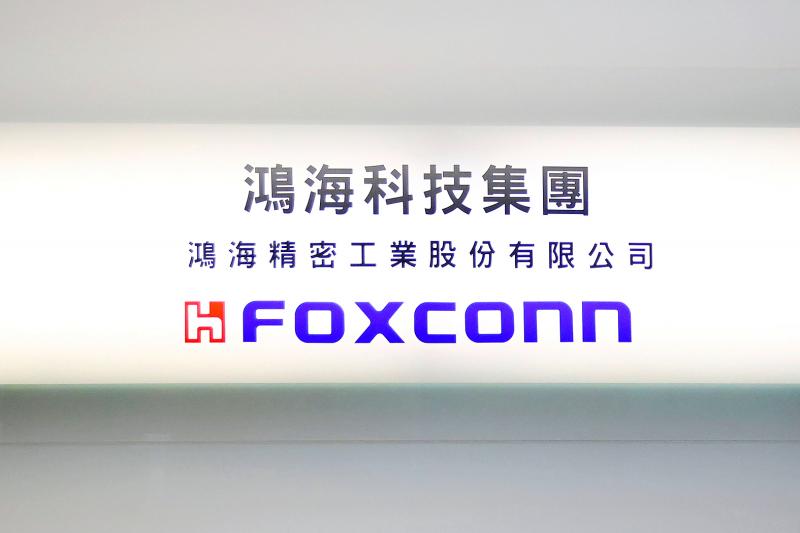Hon Hai Precision Industry Co (鴻海精密) has been focused on securing critical standard 5G patents to boost its competitiveness in the field, company chairman Liu Young-way (劉揚偉) said on Wednesday.
The company has also started research and development of 6G chips to stay ahead of the game in emerging technologies, Liu told a smart industry development forum in Taipei.
Hon Hai, the world’s largest contract electronics manufacturer, has secured 1,465 standard 5G patents so far, making it the ninth-largest standard 5G patent holder in the world.

.Photo: Reuters
Also known as Foxconn in the global market, the company envisions that 5G technologies would not only change people’s way of life, but also create tremendous business opportunities in the electronics sector, Liu said.
Since 2018, 5G technologies have been meeting the need for new communications applications in a growing global population, he said.
However, along with the introduction of new technologies, the global supply chain is becoming increasingly complicated, Liu said.
Against that backdrop, Hon Hai is working to expand its product portfolio with software, processors and computing devices for new communications technologies, he said.
The company’s new 5G technologies would include a wide range of applications, such as automotive electronics and smart production, Liu said.
In addition, Hon Hai and its telecom service subsidiary, Asia Pacific Telecom Co (亞太電信), are teaming up with Far EasTone Telecommunications Co (遠傳電信) to develop new communications technologies, including 6G applications and quantum computing, he said.
Quantum computing is expected to improve 5G base stations, while 6G chips are seen as vital to future communications, he said.
Asked about Taiwan’s exclusion from the recently signed Regional Comprehensive Economic Partnership (RCEP), Liu said it was unlikely to affect his company’s business.
Hon Hai has long been mapping out development strategies to extend its reach in the Asia-Pacific, and as the RCEP is a regional agreement, it is in line with the company’s vision, he said.
Commenting on Hon Hai’s share price, Liu said that the stock is undervalued, with a low price-to-book ratio and a price-to-earnings ratio that is lower than its peers, despite its promising future, he said.
The company has in the past few years expanded from hardware manufacturing only into software development to boost its profitability, he said.
In the initial phase of diversification, Hon Hai’s gross margin is expected to increase by 1 percentage point to 7 percent, and when the upgrade is completed, it is forecast to rise to 10 percent by 2025, Liu said.
Hon Hai shares yesterday closed 1.22 percent higher at NT$83 in Taipei trading, outpacing the TAIEX, which rose 0.78 percent to 13,845.66.
Since the beginning of the year, Hon Hai shares have dropped by 8.6 percent, while the broader market has gained about 15 percent.

Intel Corp chief executive officer Lip-Bu Tan (陳立武) is expected to meet with Taiwanese suppliers next month in conjunction with the opening of the Computex Taipei trade show, supply chain sources said on Monday. The visit, the first for Tan to Taiwan since assuming his new post last month, would be aimed at enhancing Intel’s ties with suppliers in Taiwan as he attempts to help turn around the struggling US chipmaker, the sources said. Tan is to hold a banquet to celebrate Intel’s 40-year presence in Taiwan before Computex opens on May 20 and invite dozens of Taiwanese suppliers to exchange views

Application-specific integrated circuit designer Faraday Technology Corp (智原) yesterday said that although revenue this quarter would decline 30 percent from last quarter, it retained its full-year forecast of revenue growth of 100 percent. The company attributed the quarterly drop to a slowdown in customers’ production of chips using Faraday’s advanced packaging technology. The company is still confident about its revenue growth this year, given its strong “design-win” — or the projects it won to help customers design their chips, Faraday president Steve Wang (王國雍) told an online earnings conference. “The design-win this year is better than we expected. We believe we will win

Quanta Computer Inc (廣達) chairman Barry Lam (林百里) is expected to share his views about the artificial intelligence (AI) industry’s prospects during his speech at the company’s 37th anniversary ceremony, as AI servers have become a new growth engine for the equipment manufacturing service provider. Lam’s speech is much anticipated, as Quanta has risen as one of the world’s major AI server suppliers. The company reported a 30 percent year-on-year growth in consolidated revenue to NT$1.41 trillion (US$43.35 billion) last year, thanks to fast-growing demand for servers, especially those with AI capabilities. The company told investors in November last year that

Power supply and electronic components maker Delta Electronics Inc (台達電) yesterday said it plans to ship its new 1 megawatt charging systems for electric trucks and buses in the first half of next year at the earliest. The new charging piles, which deliver up to 1 megawatt of charging power, are designed for heavy-duty electric vehicles, and support a maximum current of 1,500 amperes and output of 1,250 volts, Delta said in a news release. “If everything goes smoothly, we could begin shipping those new charging systems as early as in the first half of next year,” a company official said. The new